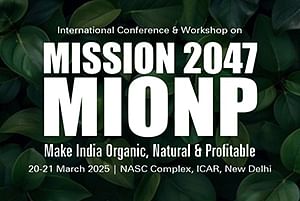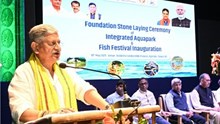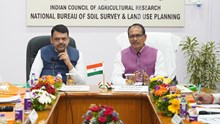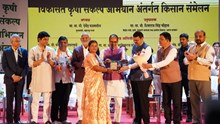
The Director-South Asian of the IFPRI, Dr Shahidur Rasheed, has stressed the necessity for India to investigate alternative agricultural practices in order to protect groundwater resources and avoid soil degradation.
Rashid made this statement at the launch of the GFPR (Global Food Policy Report) in the Nepalese city of Kathmandu in order to promote the development of heat-resistant crop varieties and the adoption of sustainable irrigation methods.
According to Rashid, flood irrigation, commonly used in rice cultivation, leads to water wastage and reduces water use efficiency. He suggested that implementing innovative irrigation methods and harnessing solar power for irrigation can significantly reduce carbon footprints and alleviate water scarcity issues. Rashid also highlighted the challenges faced by India in ensuring accessibility, nutritional value, and long-term stability in its food production.
The current agricultural system in India, which has heavily relied on groundwater exploitation and the use of chemical fertilizers since the Green Revolution, is unsustainable in the long run, according to Rashid. He called for a shift towards alternative agricultural approaches that conserve groundwater resources and preserve soil health, citing the soil health card initiative as an important tool for addressing nutrient deficiencies in the soil and promoting the production of nutritionally rich crops.
Rashid emphasized the importance of integrating nutrition components into social safety net programs to combat hidden hunger and nutritional deficiencies effectively. The GFPR South Asia report highlighted that India had a 16% prevalence of undernourishment between 2019 and 2021, emphasizing the need to address these issues to ensure a healthy future generation.
Regarding food availability, accessibility, and affordability, Rashid acknowledged that income disparities in India hinder large sections of the population from affording a healthy diet. He also emphasized the role of cultural preferences and habits in determining the effectiveness of nutrition interventions. To overcome cultural barriers, especially in rice-consuming regions, Rashid suggested developing crop varieties fortified with essential micronutrients.
Rashid called for a paradigm shift in irrigation practices to improve water use efficiency and mitigate groundwater depletion. He stressed the importance of developing heat-tolerant crop varieties and adopting sustainable irrigation techniques. Rashid also highlighted the environmental impact of food loss and waste and urged for a comprehensive approach to address this issue and ensure environmental sustainability.
One major concern raised by Rashid is the high fertiliser subsidy in India, which can lead to excessive nutrient application and groundwater contamination. He cited the example of northern Bangladesh, where excessive urea and other fertilisers have caused groundwater contamination and the emergence of health issues related to arsenic contamination.
While acknowledging the resilience and potential contribution of alternative crops like quinoa and millet to climate change mitigation and soil conservation, Rashid cautioned against perceiving them as universal solutions due to the scale of global food demand. He emphasized the need for collaboration and knowledge exchange between institutions like the Indian Council of Agricultural Research (ICAR) and international centers of excellence to expedite the development of sustainable crop varieties.
Rashid concluded by advocating for a re-evaluation of agricultural policies, urging a transition away from excessive subsidies. He emphasized the importance of redirecting financial resources currently spent on subsidies towards investments in sustainable agriculture to address pressing challenges such as climate change and crisis management.

















